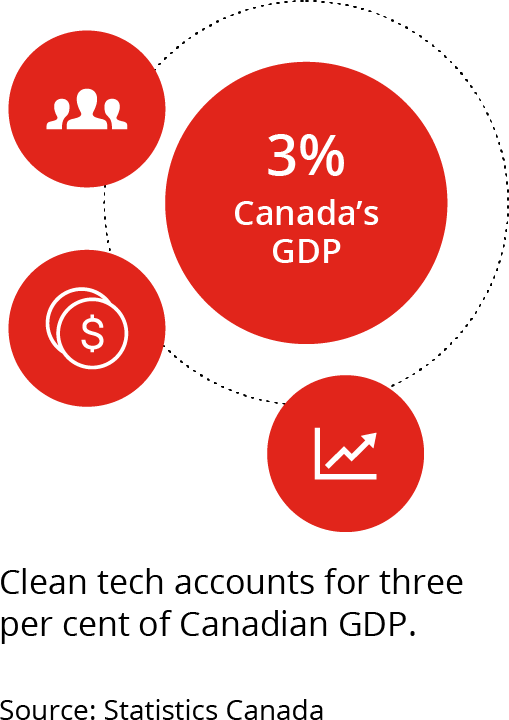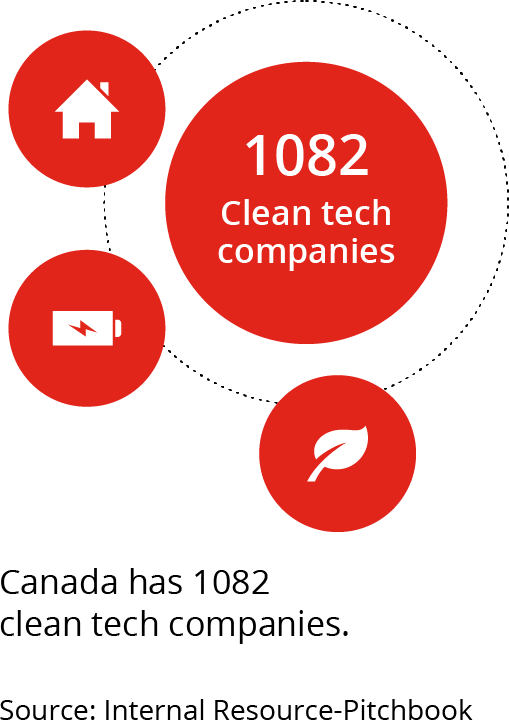As transition to a lower-carbon future accelerates globally, Canadian ventures are attracting the attention of investors by leading innovation in clean tech
The world appears to have reached an important tipping point for action to combat climate change, with market signals, government policy and investor behaviour increasingly in alignment. Climate action is now seen as a source of jobs and economic prosperity; compared with a business-as-usual estimate, shifting to a green economy is predicted to yield benefits of US$26tn by 2030.
Source: United Nations
Global benefit of shifting to a green economy
Source: Natural Resources Canada
Comparing renewable energy sources in Canada against the world average
Canada is collaborating with stakeholders and jurisdictions across the country and around the world to bring innovative and competitive clean technologies to market. Clean tech companies are set to benefit from this changing demand. Canadian clean tech exports by technology firms totalled C$13.5 billion in 2019 and accounted for three per cent of Canada’s GDP. Canada ranks second on the Global Cleantech Innovation Index 2021, behind the US but in front of Germany, France and the UK, in which 11 Canadian companies feature across a range of sectors, including energy and power, resources and environment, and transportation and logistics.
Jane Kearns, VP of growth services at MaRS – a launchpad for start-ups that has supported more than 1,400 Canadian science and tech companies – believes the 2021 Cleantech 100 proves Canada’s clean tech sector has both strength and depth. “If you look at the companies on the list, they are working in fields as diverse as mining, electricity grid management and consumer electronics,” she says. “It shows our companies aren’t just competing with the best in the world; they are leading the world, and doing so across the board.”
Headquartered in Toronto, ecobee creates smart thermostats that learn their owners’ daily routines and automatically adjust the temperature to reduce energy consumption when nobody is home. Ecobee’s thermostats are also able to assess when the cheapest and cleanest energy is available and operate accordingly. The company estimates that its innovative thermostats save energy equivalent to taking 2.7m cars off the road for a year.
Investments in clean tech will benefit from the growing appetite for cross-sector innovation in aerospace, agribusiness and automotive.
Source: The Global Cleantech 100
Canadian clean tech industry ranks highly globally
In the Cleantech 100 fields of resources and environment, Canadian companies are proving to be world leaders in the field of carbon capture and storage. US construction supplier Lehigh Hanson is pursuing a unique feasibility study in full-scale carbon capture by aiming to capture 90–95 per cent of the carbon dioxide (CO2) – an estimated 600,000 tonnes annually – from the flue gases of its cement plant in Edmonton, Alberta.
In Nova Scotia, CarbonCure is injecting CO2 into wet concrete, strengthening the concrete while reducing the amount of cement required in the process. In September 2020, CarbonCure announced a new round of investment from leading technology and property developers, including Amazon and Breakthrough Energy Ventures (BEV), who co-led the investment syndicate.
“We are excited to invest in CarbonCure, a company producing stronger, more sustainable concrete, which will help Amazon and other companies meet the Climate Pledge, a commitment to be net zero carbon by 2040,” said Kara Hurst, vice president of sustainability, Amazon. “We are looking forward to lowering the carbon footprint of many of our buildings by using CarbonCure concrete, including in Amazon’s HQ2 building in Virginia.”
Shifting priorities and investment patterns of this type represent a green light for entrepreneurs, innovators and investors alike in Canada’s clean tech sector, which is predicted to generate around USD $1.2 billion across Canada.
Back to top









